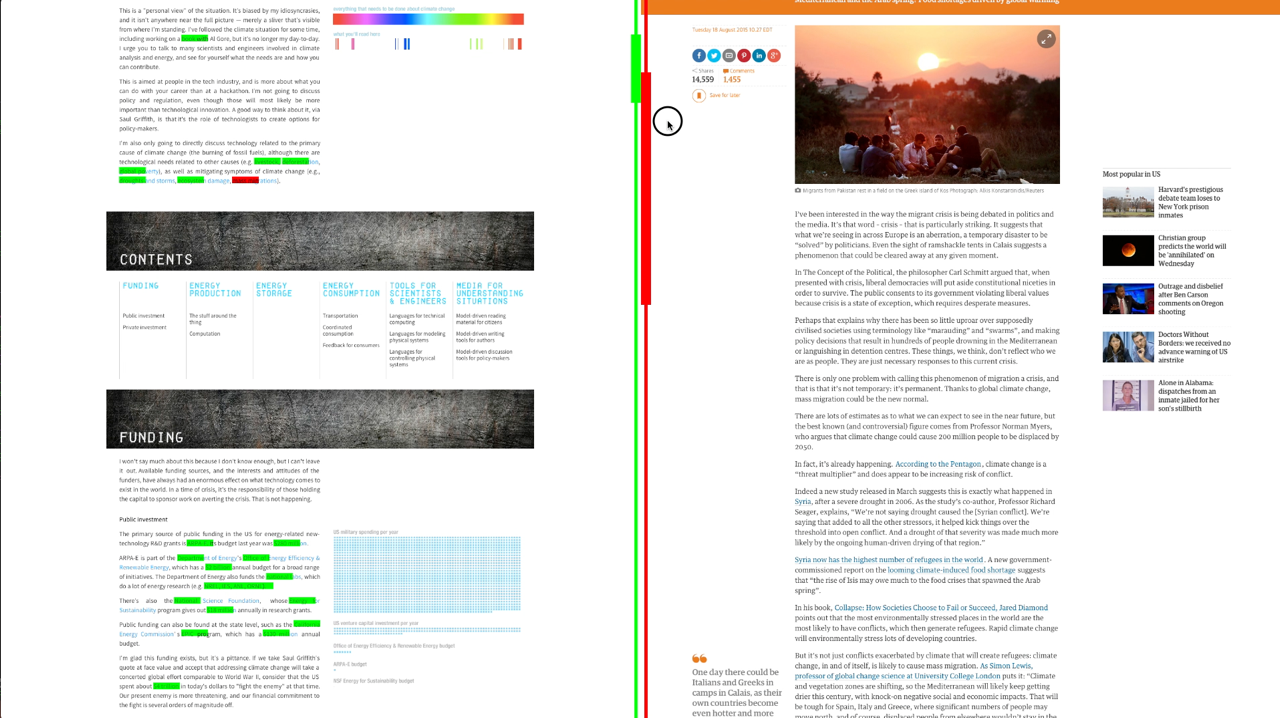Dear Bret—
The shame of reading this for the first time on an airplane!
(I respectfully disagree with Saul: the more I travel, the more I video conference, and the more I video conference the more I travel. It’s a vicious cycle.)
I don’t think this will be useful for you. I’m not even sure if it will lead you to smile or despair, but I’m hoping for the former:

You had so many references that I made a toy web browser to automatically open all of the hyperlinks as I read. Here’s a short screencast:
Oh! There’s one usable thing. You have a dead link to Ten Brighter Ideas (a missing “t,” see 01:39).
Beyond that, I liked getting a “feel” for the sources underlying your claims, and I also read quite a few of them. You have more than 150 links, and I was curious if they could do more than scare away would-be critics/doubters. At first skim, the amount of design and gloss on the right-hand column is a little overwhelming. (Especially so in contrast to the lack of coherent political design around climate change.) You get at our bibliographic crisis in the “Literacy and standards” section.
In general, I found the high-level structure excellent and very much focused around the title question. I felt a little tension between the “concerted global effort comparable to World War II” and a tone that’s otherwise more incremental/optimization-focused (is that the tone you were attempting?). I don’t think a world war feels like slightly refracted life-patterns ("what I'd mostly like to focus on here isn't consuming less energy so much as consuming energy differently”) and tech-systems.
This is an out-of-left-field comment, but I had a little pang of fear that there’s almost too much about the positive externalities of peripheral technological progress, without much to guide the reader in what might be a negative use of her technical prowess. Is it really the case that anything that makes something more efficient will help us out of our climate hole? I don’t think that’s what you’re trying to say, but wonder if a little more acknowledgement that technology has gotten us into this mess—that it’s not all good—would be beneficial. Hydraulic fracking comes to mind (I think its techno-development had been one of the biggest price-competitors to renewables), but I don’t really know what I’m talking about here…
It seems like the section on model-based thinking is still waiting for a (maybe interactive) introduction, so perhaps this comment will be moot, but I wish we had a good example of model-based thinking having a demonstrable political effect. A few weeks ago, Bryan Newbold told me about an urban planning tool called streetmix for model-based urban planning thinking, which seems to have had some interesting political uses. Haven’t looked into it too closely, but it might be a nice shoutout to the humble bicycle, to technical people engaging with politics, as well as to model-based thinking.
Your correspondent,
R.M.O.
On Oct 2, 2015, at 6:19 PM, Bret Victor wrote:Hi. I'm writing a thing about climate change. I don't know why I thought I was qualified to write this, and it's probably terrible.It's time to share a first draft, so here:http://worrydream.com/TechnologistsAndClimateChange/1/It's "half-written", which is to say that the left half is written (but drafty). The right half will hopefully be charts and pictures (possibly interactive but probably not) supporting the stuff on the left, but I haven't made most of that yet.Constructive comments, editing, fact-checking, and ghost-writing are welcome. (Thank you.)